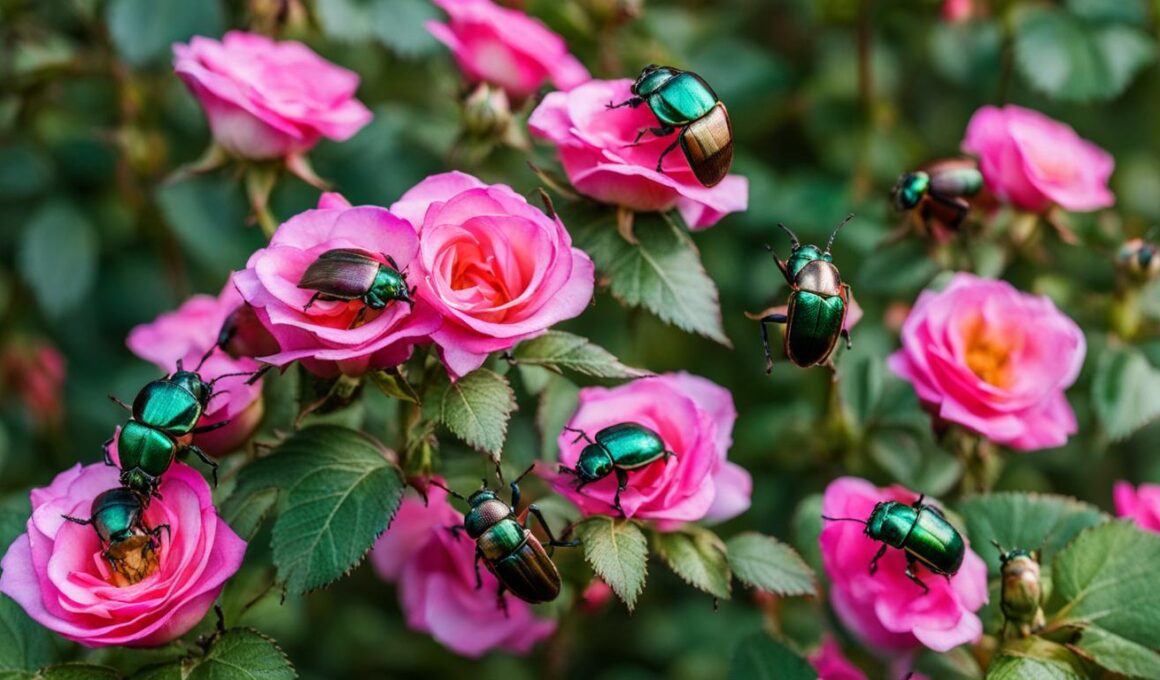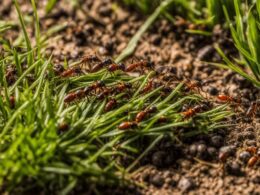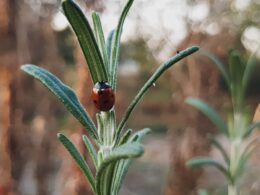Welcome to our guide on controlling and preventing Japanese beetles on your beautiful roses. These destructive pests can wreak havoc on your delicate blooms, but with the right strategies and techniques, you can protect your roses and keep them thriving. In this article, we will provide you with expert tips and advice on how to effectively control and prevent Japanese beetles, ensuring your roses remain healthy and vibrant.
Japanese beetles are invasive insects that were first introduced in the United States in 1916. Since then, they have been slowly spreading westward and are now commonly found in gardens east of the Mississippi River. These pests have a particular affinity for roses, causing significant damage to the leaves and flowers.
Identifying Japanese beetles is crucial for effective control. These beetles can be easily recognized by their metallic blue-green heads and copper-colored backs. They are about half an inch long and typically feed in groups. The damage they cause is characterized by skeletonized leaves, where they chew away the tissue between the veins, leaving only the veins behind.
To control and prevent Japanese beetles on roses, there are several methods you can employ. One effective approach is handpicking the beetles from your plants and drowning them in a bucket of soapy water. This reduces the beetle population and prevents new beetles from emerging.
Milky Spore is another method that targets Japanese beetle grubs in the soil. It is a bacterium that can take several seasons to fully control the population. Attracting beneficial insects like parasitic wasps and planting geraniums near your roses can also help deter Japanese beetles.
Although neem oil is sometimes used to control Japanese beetles, its effectiveness is still being studied. It may be worth exploring as an additional option, but its use should be carefully considered.
In conclusion, by implementing a combination of control and prevention methods, you can effectively manage Japanese beetles on your roses. Regular monitoring, early intervention, and a proactive approach are key to maintaining the health of your garden. With our tips and guidance, you can protect your roses and enjoy their beauty throughout the season. Stay tuned for more valuable insights on garden pests and how to combat them.
Identifying Japanese Beetles on Roses
If you spot small, metallic blue-green beetles with copper-colored backs on your roses, you’ve likely come across Japanese beetles. These pests are about half an inch long and are known for feasting in groups.
The damage caused by Japanese beetles is quite distinct. They chew away the tissue between the veins of the leaves, leaving only the veins behind. This results in what’s known as skeletonized leaves. While roses are particularly vulnerable to this damage, Japanese beetles also target other plants such as beans, grapes, and raspberries.
To give you a better visual understanding, take a look at the image below:
As you can see, the image captures the metallic blue-green heads and copper-colored backs of these Japanese beetles, showcasing their distinct appearance. Identifying them is crucial in order to take effective control and prevention measures to protect your roses from their damage.
Control and Prevention Methods for Japanese Beetles on Roses
When it comes to dealing with Japanese beetles on your roses, there are several effective control and prevention methods you can implement. By taking action, you can protect your roses from the damage caused by these destructive pests.
1. Handpicking: One common approach is to physically remove the beetles by handpicking them from the plants. Wear gloves and drop the beetles into a bucket filled with soapy water. This simple method reduces the beetle population and prevents new beetles from emerging.
2. Milky Spore: Another method is the use of Milky Spore, a bacterium that targets Japanese beetle grubs in the soil. Apply this product in your garden, as directed, and it will take several seasons for it to fully control the population. Be patient and persistent in using Milky Spore as part of your control strategy.
3. Beneficial Insects: Attracting beneficial insects like parasitic wasps can help deter Japanese beetles. These natural predators feed on the beetle larvae, keeping their numbers in check. Additionally, planting geraniums near your roses can also help repel Japanese beetles, as they are known to dislike the scent of geraniums.
4. Neem Oil: Neem oil is another option for controlling Japanese beetles on roses. However, its effectiveness is still being studied. Apply neem oil to the affected plants, following the manufacturer’s instructions, and monitor its impact on the beetles.
By combining these control and prevention methods, you can effectively reduce the population of Japanese beetles on your roses and protect them from further damage. Experiment with different strategies to find the approach that works best for your garden and individual circumstances.
Remember, prevention is key when it comes to managing Japanese beetles. Regularly inspect your roses for any signs of beetle activity, such as skeletonized leaves, and take action as soon as you spot them. With diligent care and the implementation of these control methods, you can keep your roses healthy and thriving, free from the damage caused by Japanese beetles.
Conclusion
Dealing with Japanese beetles on your roses requires a combination of control and prevention methods. By taking proactive measures such as handpicking the beetles, using Milky Spore, attracting beneficial insects, and considering neem oil, you can effectively reduce the beetle population and protect your precious roses.
It is crucial to regularly monitor your roses for any signs of damage and take prompt action as soon as the Japanese beetles arrive. While these pests can be destructive, they will only set your plants back temporarily and are not likely to kill them. With the proper control and prevention measures in place, you can keep your roses healthy and thriving.
Remember, prevention is key. Starting with a healthy garden from the beginning can greatly reduce the impact of Japanese beetles. Implementing these control and prevention strategies will ensure that your roses continue to flourish and bring beauty to your outdoor space.
How Can I Prevent Japanese Beetles from Damaging my Garden like Brown Spots on Green Beans?
To prevent the causes and prevention of brown spots on green beans caused by Japanese beetles, try using floating row covers to protect plants. Consider planting beetle-resistant varieties. Handpick the beetles off the plants and drop them into soapy water. And if necessary, use a biological control like milky spore.
How Can I Control and Prevent Japanese Beetles from Eating My Trumpet Vine Flowers?
To control and prevent Japanese beetles from eating trumpet vine flowers causes frustration for many gardeners. Try using insecticidal soap or neem oil to deter them. Hand pick and drop them in soapy water, or use pheromone traps to reduce their numbers. Planting garlic or tansy nearby may also help repel them.










